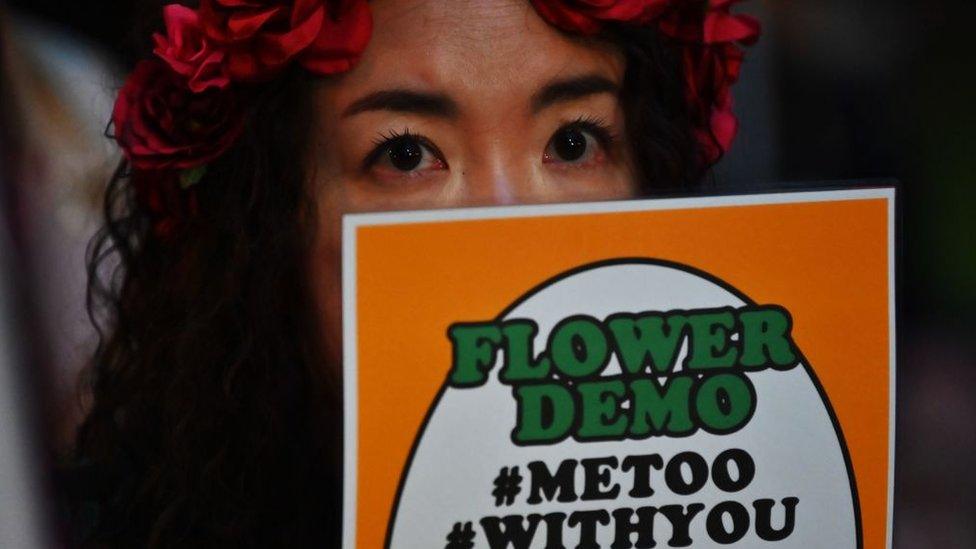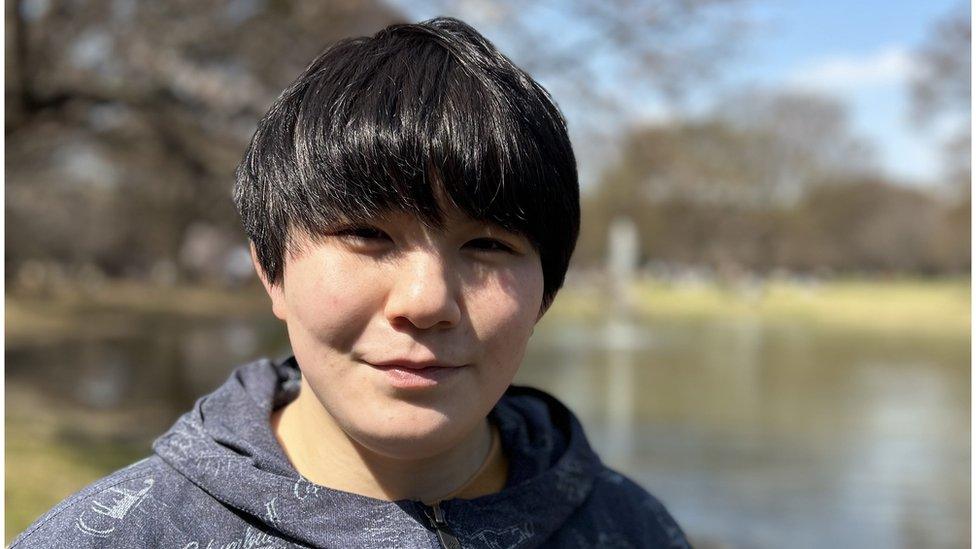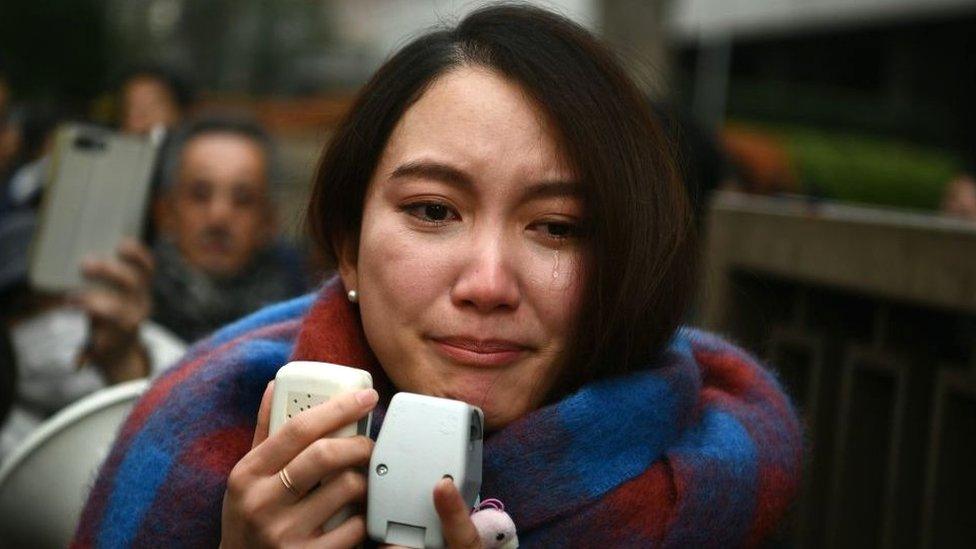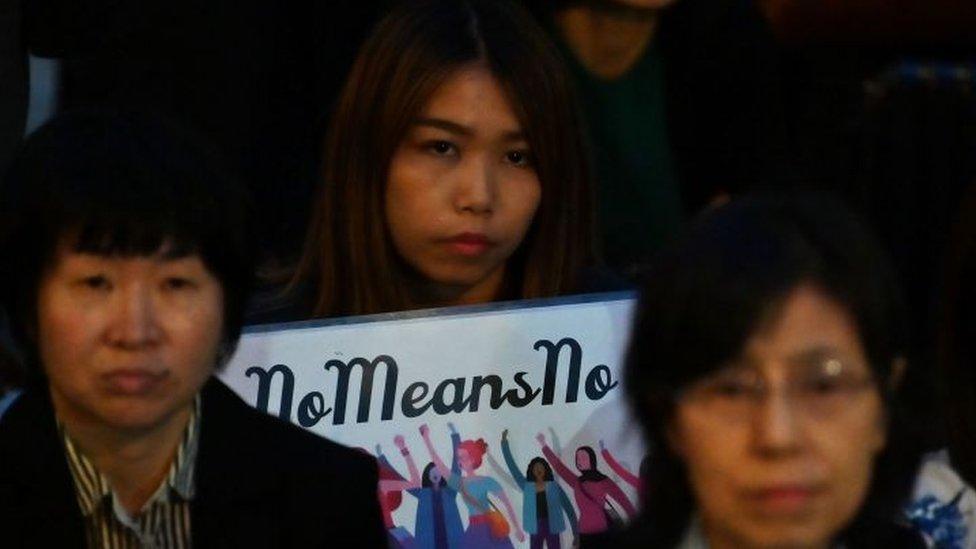Japan redefines rape and raises age of consent in landmark move
- Published

Japan's nationwide Flower Demo campaign against sexual violence started in 2019
Japan has passed laws that redefine rape and raise the age of consent in a landmark overhaul of sex crime laws.
The definition of rape was broadened to "non-consensual sexual intercourse" from "forcible sexual intercourse", aligning Japanese law's definition with other countries.
The legal age of consent, previously at only 13, has been raised to 16 years.
Previous laws did not protect those coerced into having sex and deterred reporting of such attacks, critics say.
They have also led to inconsistent court decisions, fuelling calls for change.
The new laws were passed by the upper house of the Diet - Japan's parliament - on Friday. They explicitly outline eight scenarios where it is difficult for a victim to "form, express, or fulfil an intention not to consent" to sexual intercourse.
These include situations where the victim is intoxicated with alcohol or drugs; or subject to violence or threats; or is "frightened or astonished". Another scenario appears to describe an abuse of power, where the victim is "worried" of the consequences of refusal.
This is only the first time Japan has changed its age of consent since its enactment in 1907.
Previously, Japan had one of the lowest age of consent among developed nations. However, a person who has had sex with a minor aged 13 to 15 will be punished only if the person is five or more years older than the minor.
Meanwhile, the statute of limitations or legal window for reporting rape will be extended to 15 years from 10 years, to give survivors more time to come forward.
The changes also ban "photo voyeurism" which includes upskirting and secret filming of sexual acts, among other things.
It follows multiple rape acquittals in 2019 that caused national outcry and helped spur a nationwide Flower Demo campaign against sexual violence. On the 11th day of every month since April 2019, activists have gathered throughout Japan to demand justice and show solidarity with sexual assault survivors.
But some activists have told the BBC that these legal reforms address only one part of the problem.
"Distorted ideas" about sex and consent that have pervaded for generations must be addressed, says Kazuko Ito, vice-president of the Tokyo-based Human Rights Now.
Survivors of sexual assault who go public also often receive threats and nasty comments online.
Even if the reforms are enacted, survivors must feel empowered to report their attacks, activists say.
In Japan, survivors of sexual violence are often reluctant to come forward because of stigma and shame. A 2021 survey by the government showed that only about 6 per cent of women and men reported an assault half of the women polled felt they couldn't do so because of "embarrassment".
"Nationwide learning and educational effort is essential for this norm to be embedded in the society. This is only way to prevent actual sexual violence along with ending culture of impunity," Ms Ito says.
Japan should also offer more financial and psychological help for sexual assault survivors, lawyer and rights advocate Sakura Kamitani told the BBC.
Attackers too should receive support to prevent recidivism, she added.

The fight for consent in Japan
Tessa Wong, BBC News
The biggest and most significant change to the laws is the one that redefines rape from "forcible sexual intercourse" to "non-consensual sexual intercourse" - effectively making legal room for consent in a society where the concept is still poorly understood.
Activists argue that Japan's narrow definition has led to even narrower interpretations of the law by prosecutors and judges, setting an impossibly high bar for justice and fostering a culture of scepticism that deters survivors from reporting their attacks.
In a 2014 Tokyo case, for instance, a man had pinned a 15-year-old girl to a wall and had sex with her while she resisted. He was acquitted of rape as the court ruled his actions did not make it "extremely difficult" for her to resist. The teenager was treated as an adult.
"The actual trial processes and decisions vary - some defendants were not convicted even if their acts were proven to be non-consensual, as they did not meet the case of 'assault or intimidation'," says Yuu Tadokoro, a spokesman for Spring, a sexual assault survivor group.
But the reforms address only one part of the problem, say activists, whose call for change stretches well beyond the courtroom.
Sexual assault is still a taboo subject in Japan and has gained national attention only in recent years in the wake of high-profile cases such as Shiori Ito's court battle, former member of the Self Defence Force and sexual assault survivor Rina Gonoi's public statements, and the Johnny Kitagawa expose.
Read more of our story on why Japan finally reformed its sex assault laws.
Related topics
- Published11 June 2023

- Published7 June 2023

- Published6 June 2023

- Published2 May 2023

- Published6 March 2023

- Published20 February 2023
